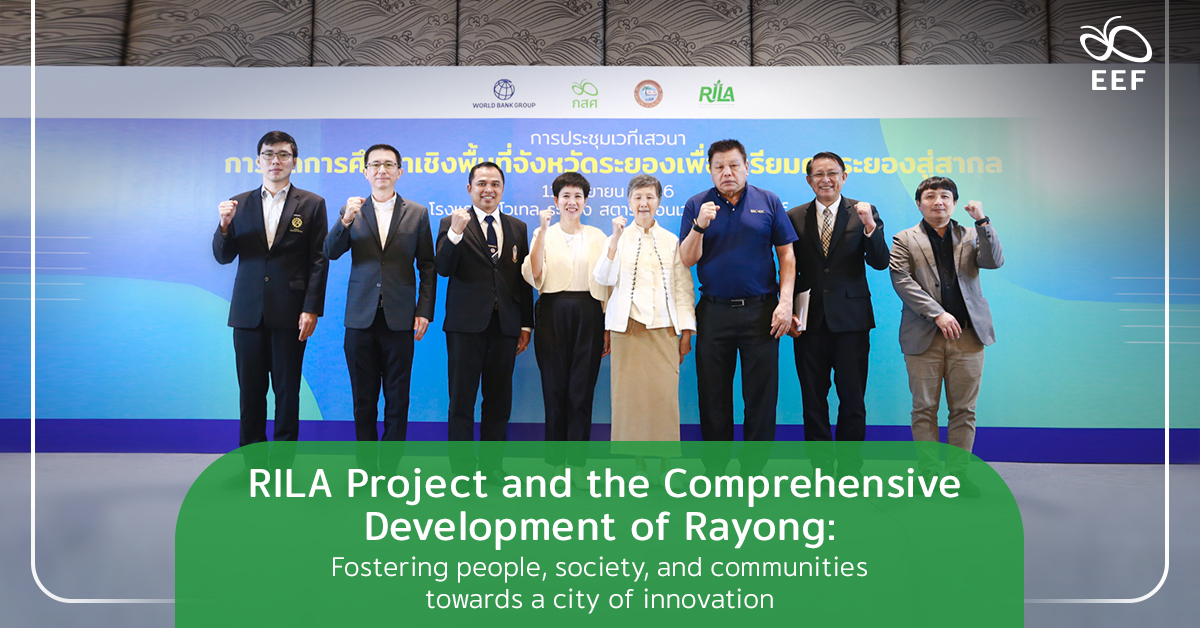
In Thailand, each province has its diverse geography, including the diversity of resources, environment, culture, and local lifestyles. Therefore, development approaches must vary according to each context. Similarly, the issue of education inequality cannot be solved with a single, one-size-fits-all solution.
The “Area-based Education Project to Reduce Inequality” (Area-based Education: ABE), carried out by the Equitable Education Fund (EEF) Thailand in collaboration with pilot areas led by the Rayong Inclusive Learning Academy (RILA), aims to downscale operations from the national or regional level by gathering knowledge, experiences, expertise, and local resource. It then creates mechanisms for decentralization, allowing each province or area to design its educational management methods suitable for its specific challenges. This is because educational personnel and community members understand the conditions and problems best. They are the story and problem owners with the will and role to motivate community members to work together.
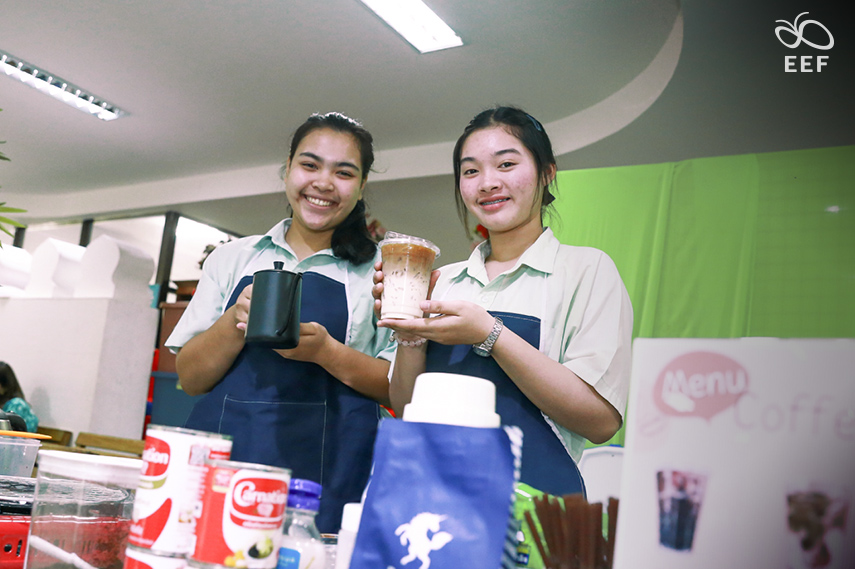
“Education Management in responding to skills Development,” all stakeholders must be able to assess future workforce needs and develop mechanisms leading to success by finding ways to provide the target group with access to quality learning, including mainstream education and alternative education. Those who go through this learning process must be able to stand on their own in the long term, and each part must work together in an integrated manner.
Therefore, the “Area-based Education in Rayong to Prepare Rayong for the Global Stage” was organized to ensure that all sectors focus on the same goal and move together as a province. This allows Rayong to break away from the old methods that rely on policies from the central government or a “top-down” policy approach and move towards a “bottom-down” approach in task delegation. This will be the starting point for discovering new working models or educational innovations that meet the needs of human development, pursue a career, and live life according to individuals’ diverse contexts and intentions.
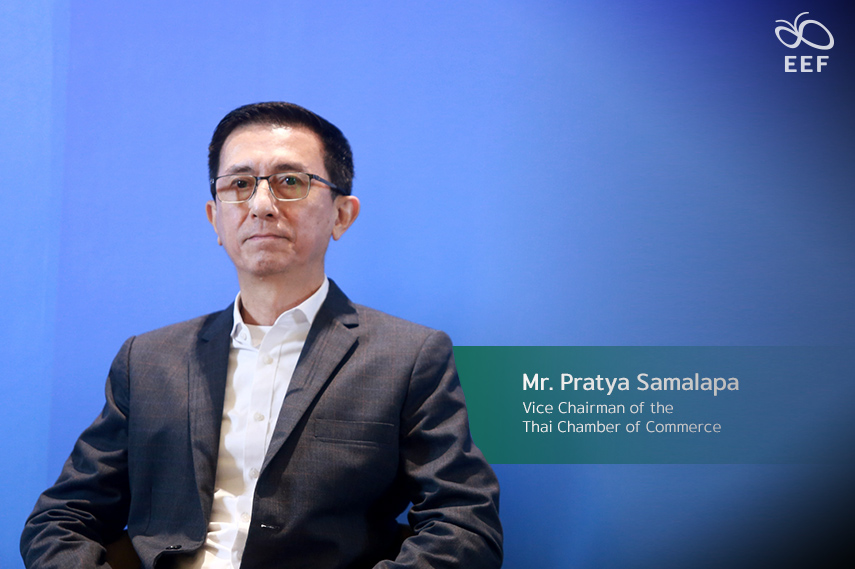
Mr. Pratya Samalapa, Vice Chairman of the Thai Chamber of Commerce, advised that countries that have made significant leaps in educational development have adapted knowledge and technology from the original models. Therefore, we can learn from these models and synthesize the parts that are similar and necessary for our area. Starting everything from scratch by ourselves might lead us astray, and we would have lost countless opportunities, time, and resources to get back on track.
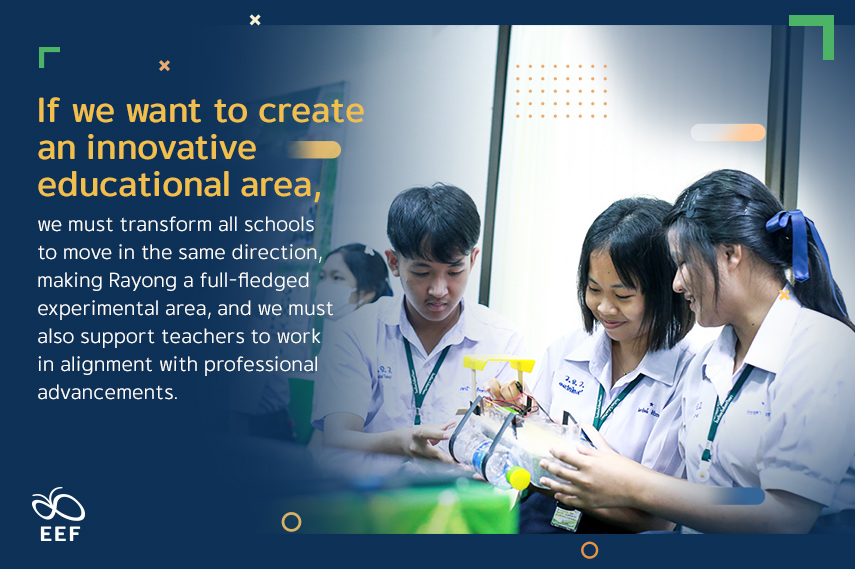
If we want to create an innovative educational area, we must transform all schools to move in the same direction, making Rayong a full-fledged experimental area, and we must also support teachers to work in alignment with professional advancements.
He also stated, “Regarding the mechanism for human development, we might need to start from scratch and work together to break down barriers. For instance, if we want to create an innovative educational area, we must transform all schools to move in the same direction, making Rayong a full-fledged experimental area, and we must also support teachers to work in alignment with professional advancements.”
“Another issue is the need to supplement the workforce exactly where it is lacking and to retain knowledge within the area, reducing the mobility of teachers. This can be achieved by giving priority to local teachers for job placements. These are among the things I believe that if all parties join hands together to think and seek ways to improve, we can unlock limitations and move in the same direction as a province. Then, Rayong could be among the first provinces in Thailand to reform the educational system successfully.”
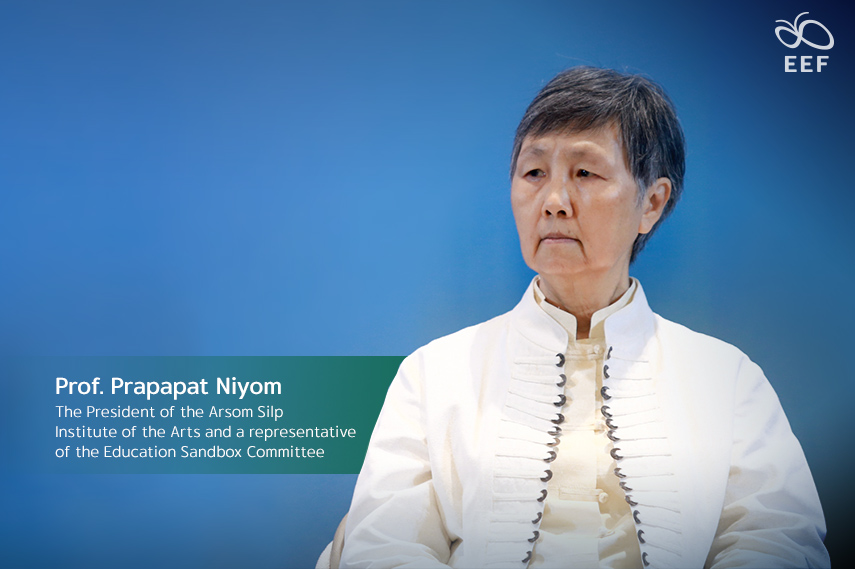
Regarding Area-Based Education, Prof. Prapapat Niyom, the President of the Arsom Silp Institute of the Arts and a representative of the Education Sandbox Committee, defined these efforts as “Setting goals according to global trends but scaling down the work to the provincial level. This clarifies where to set the goals, which methods to use, and whom to work with to achieve results quickly. Because if we allocate time, personnel, energy, and resources correctly, choosing to work where there’s a high probability of success and sufficient policies, we will know which direction to go.”
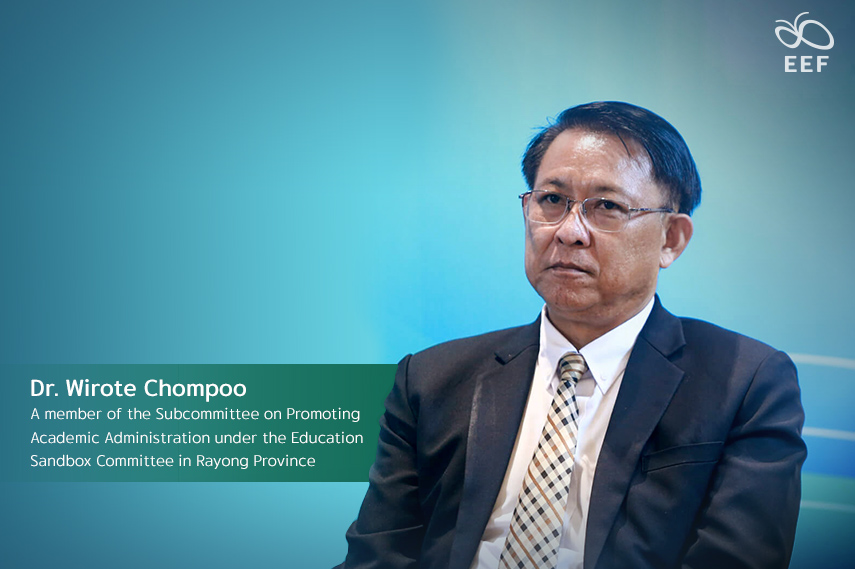
Dr. Wirote Chompoo, a member of the Subcommittee on Promoting Academic Administration under the Education Sandbox Committee in Rayong Province, added, “As the world enters the era of Disruption, knowledge is in everyone’s mobile phone. Therefore, education has evolved into a facilitator or ‘learning enabler’, where teachers must shift from ‘owners of knowledge’ to the learning process facilitator, helping to understand the content and assisting learners in analyzing and synthesizing knowledge for application.”
“In a nutshell of Rayong’s education, we must develop a curriculum emphasizing foundational skills. What is unnecessary should be removed, and what is essential must be integrated into real learning experiences, not simply retained in the curriculum as indicators. We need to allocate more hours to cultivate creative thinking skills than before; it’s not about providing knowledge alone for 1,200 full hours, which contradicts the development of children’s brain skills. This means the educational curriculum must be developed to fit the child, as each child is different. The curriculum must be good enough to support the talents of each child, allowing them to pursue success according to their aptitudes.”
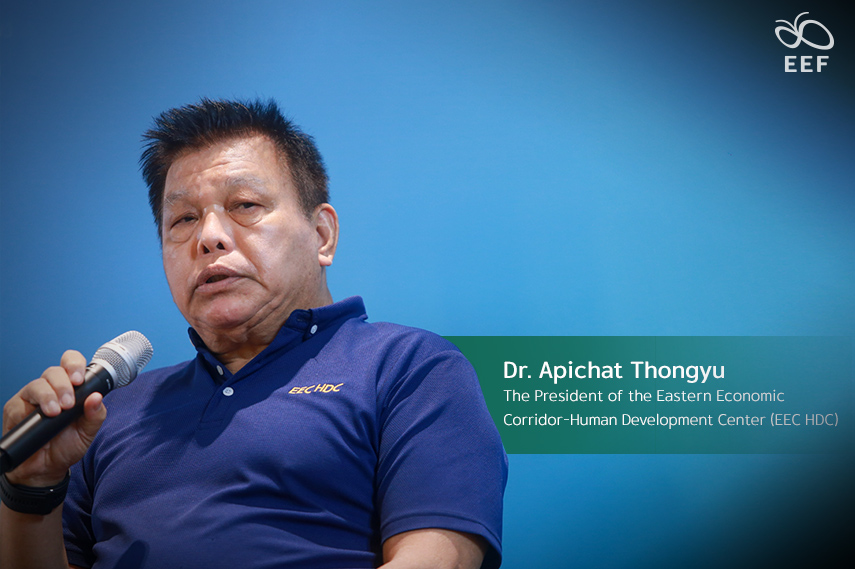
Dr. Apichat Thongyu, the President of the Eastern Economic Corridor-Human Development Center (EEC HDC), commented, “Before we can move forward together, we must have a city development plan related to personnel development. By looking at our foundational skills, we find that many people are skilled in analog techniques while the world has fully moved to digital platforms. Therefore, the challenge is producing a new generation knowledgeable in driving technology.”
“Developing education in the EEC (Eastern Economic Corridor) area, we have involved the industrial sector in helping develop the educational system to produce individuals according to the labor market’s needs. Educational institutions and businesses will develop curriculums and people together in a project called EEC Type A.” As for the education management for children, youth, and the informal workforce, the short-term curriculum designed by universities was developed into a new format, learning from the industrial sector, allowing teachers and professors to update their knowledge and adapt to the rapid changes in the global industry. For this reason, foundational skills development must focus on imparting knowledge and professional skills and consider income generation because this is the foundation of life stability.
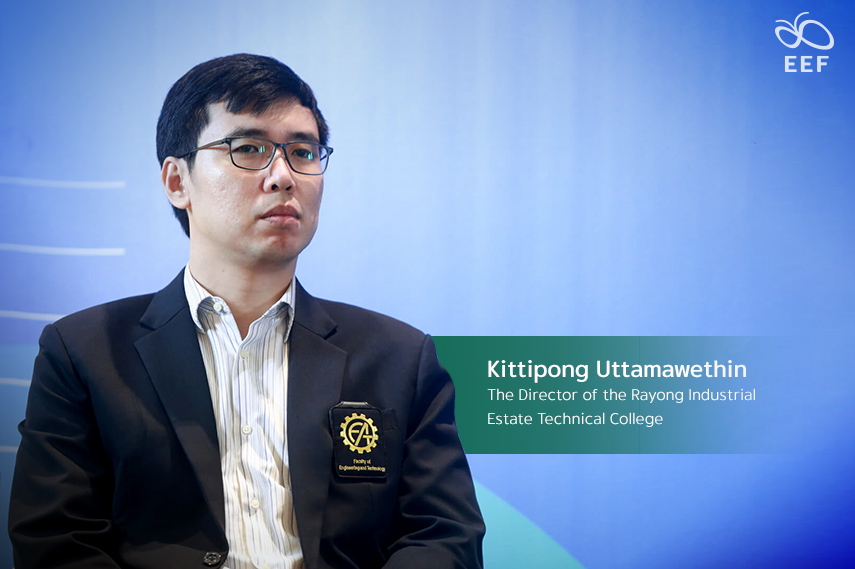
Kittipong Uttamawethin, the Director of the Rayong Industrial Estate Technical College, stated that foundational skills development must not only aim to provide knowledge and professional skills but also look towards generating income, as this is the stability of living. An important attitude in today’s world of education and work is long-term human capacity development. We cannot wait for children to graduate from university; hence, businesses must help identify the actual workforce needs and participate in creating curricula to develop individual learning plans.
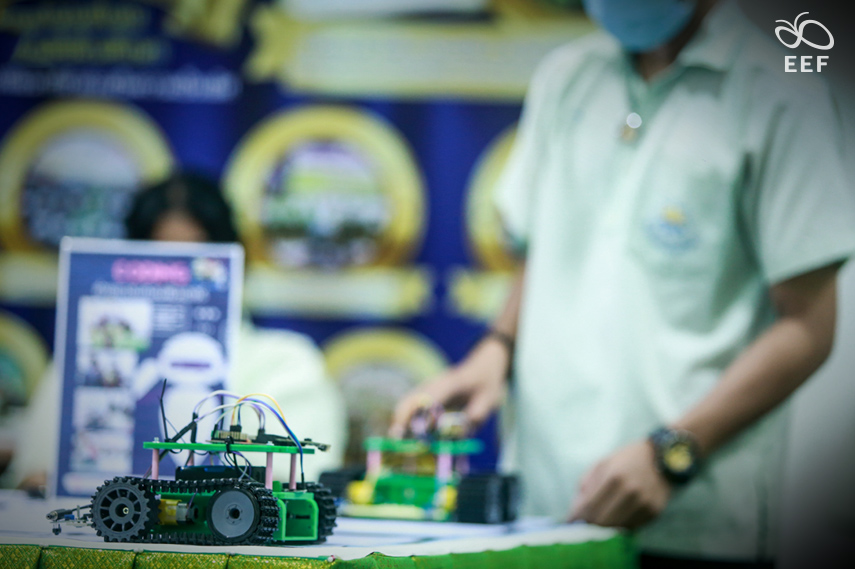
Therefore, fostering lifelong learning skills, keeping pace with technology, and adapting to future changes is essential.
This seminar thus served as a gathering of personnel involved in education, both directly and indirectly, across Rayong to initiate significant changes. Therefore, an important question everyone must help answer is: in which direction will Rayong develop its educational management? Simultaneously, suppose Rayong is to drive its economy through human development, aside from formal education. In that case, there must also be spaces for the working-age population to upgrade their skills until they gain higher remuneration.
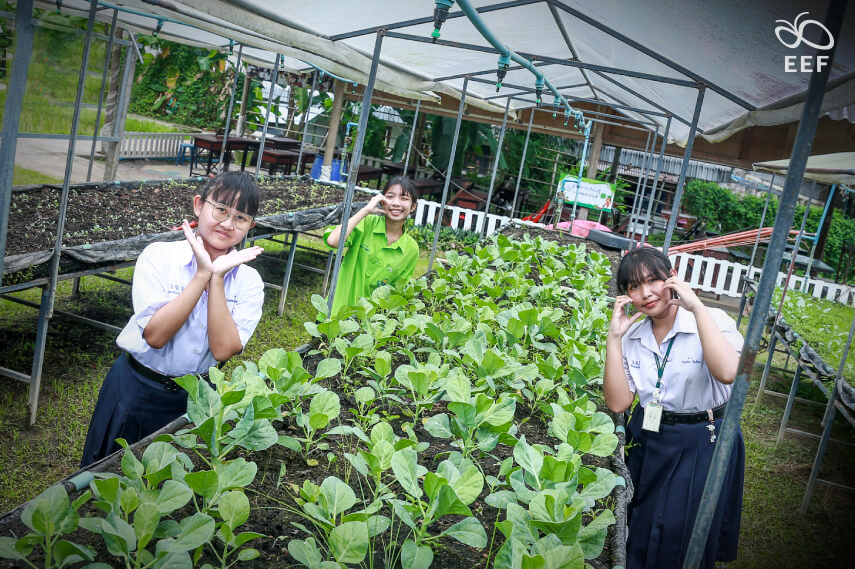
The hope is that this seminar will spark confidence in every sector that Rayong’s people can utilize education to ‘create’ and ‘direct’ the city’s growth with everyone’s power. The RILA Project will help promote and develop Rayong in all aspects to foster people, society, and communities towards becoming a city of innovation, preparing for the global stage.
Credit: Rawis Larha | Content and Writer Production Officer

